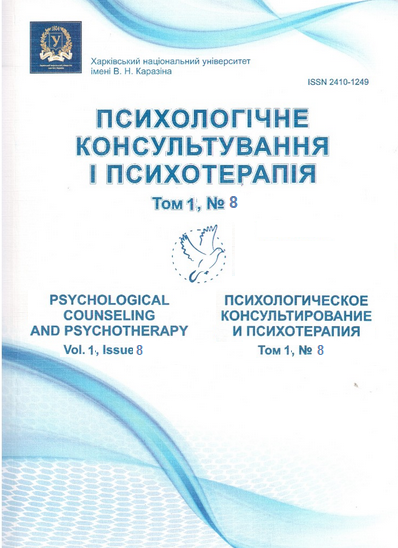Peculiarities of psychotherapeutic work with narcissically organized individuals
Abstract
The article presents the features of psychotherapeutic work with narcissistic problems, which relevant for modern society. There are two interrelated reasons which are connected with the growth of interest in the problem of narcissism: the first one –social transformations, the formation of narcissistic culture; and these condone – an increase in cases of clients with narcissistic personality organization. The growth of narcissistic pathology is associated with social changes in modern society. The consumption society, which is relevant for the present, provokes a person to the unbridled striving for success and perfectionism. This is a favorable condition for the strain of narcissistic mechanisms of personality. Different approaches to the understanding of narcissism in the frame work of psychoanalytic thinking are considered. G. Rosenfeld first developed the theory of pathological narcissism. According to his ideas, the narcissistic personality, due to it is "omnipotence", introduces a "good" partial object (in the terminology tradition of the school of object relations) and, in an omnipotent manner, as cribs itself to this object. In narcissistic object relations omnipotence I play key role. O. Kernberg understands narcissism in terms of structural peculiarities of the psyche. He classifies narcissism in a wide range from norm to pathology. H. Kohut believed that narcissism is an integral part of normal mental development of man. Understanding narcissism from the stand point of H. Kohut is reflected in the idea that the content of the problem of narcissism lies not in the extent to which one or another person is narcissistic, but in how it regulates its narcissism. Features of psychotherapeutic contact with narcissically organized individuals are described. Some strategies of psychotherapy for narcissistic clients are given.
Downloads
References
Валь Г. Теория нарциссизма / Г. Валь // Ключевые понятия психоанализа. — Санкт-Петербург : Б&К, 2001. — С. 85—93.
Джонсон С. М. Психотерапия характера. Методическое пособие для слушателей курса «Психотерапия» / Стивен М. Джонсон. — Москва : Центр психологической культуры, 2001. — 356 с.
Кернберг О. Ф. Тяжелые личностные расстройства / Кернберг О. Ф. — Москва : Класс, 2000. — 464 с.
Кохут X. Анализ самости. Системный подход к лечению нарциссических нарушений личности / X. Кохут. — Москва : Когито-Центр, 2003. — 367 с.
Мак-Вильямс Н. М. Психоаналитическая диагностика : Понимание структуры личности в клиническом процессе : пер. с англ. / Мак-Вильмс Н. М. — Москва : Класс, 1998. — 480 с.
Розенфельд Г. Деструктивный нарциссизм и инстинкт смерти / Г. Розенфельд // Журнал практической психологии и психоанализа. 2008. — № 4. — С. 13—26.
Соколова Е. Т. Нарциссизм как клинический и социокультурный феномен / Соколова Е. Т. // Вопросы психологии. — 2009. — № 1. — С. 67—80.
Соколов С. Е. Нарушение рефлексивной функции и образование защитной фантазии у пациентов с нарциссическим расстройством личности / С. Е. Соколов // Вестник психоанализа. — 2000. — № 1. — С. 57—69.
Холмс Дж. Нарциссизм. Проблемы психоанализа / Дж. Холмс. — Москва : Проспект, 2002.— 80 с.
Шварц-Салант Н. Нарциссизм и трансформация личности. Психология нарциссических расстройств личности / Н. Шварц-Салант. — Москва : Класс, 2007. — 296 с.








